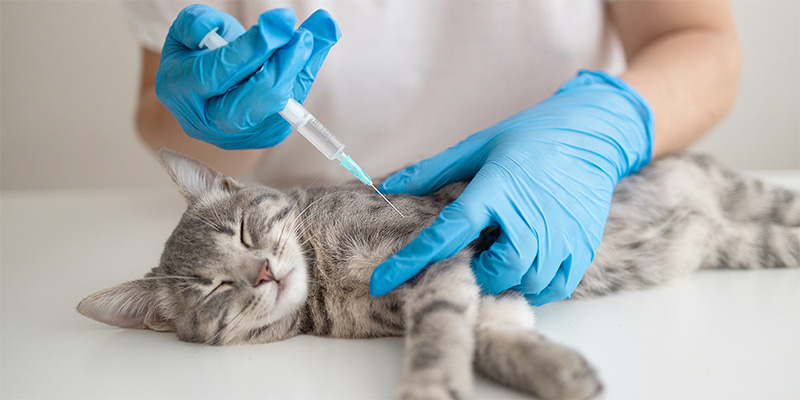
An Emergency Fund Will Save You
April 12, 2023
I took all my cats to the vet last week… all seven cats at the same time. What a production.
Whatever you’re imagining, taking seven cats to the vet is like five times worse than that. Six of the cats were well-behaved. Tars was not. Tars is just super emotional. He’s a basket case.
Wendy didn't really like getting a thermometer shoved up her butt. Naturally. But Uma has a crush on the vet. She loves him, and she climbed up onto his chest and put her arms around his neck and hugged him.
Anyway, when it came time to pay the bill, they gave me one for $1,060. Seven checkups and five shots for $1,060, which is not that bad in the grand scheme of things.
If you have one pet, like a cat or a dog, pets are not super expensive. But if you have seven cats or seven dogs, that's when costs start adding up.
Still, there's no way I'm not going to spend money on my cats. I mean, I could skip the checkups and shots. My cats are healthy; they're indoor cats. They'd likely be fine. But it's good to have a relationship with your local vet in case something goes wrong.
This falls into the category of “stuff you have to pay for.” And it’s important to prepare for these types of expenses.
Prepare for Unforeseen Costs
I have another example of this: My pool pump just dirtnapped. So, I need a new one. Another case of “stuff you have to pay for.”
Seems like every time I turn around, I need to pay to fix something. These unforeseen expenses… we have no choice but to pay ’em. Often, though, it's these kinds of payments that get people in trouble with their personal finances.
See, my theory is that most people are good with money. E.g., they don’t go on shopping sprees at Saks Fifth Avenue and come home with $40,000 in debt. Most people don't do that. It’s rare.
But there are unpredictable situations that require payments. These often lead to credit card debt, where you’re forced to pay interest forever.
The biggest one is your car. It happens all the time: You need to get your car fixed. There’s other stuff, too, like fixing the leak in your roof, repairing the dishwasher, washer, dryer, refrigerator, etc.
Build an Emergency Fund
The best way to prepare for stuff you have to pay for is to compile savings, otherwise known as emergency funds.
If you do that, the $1,000+ vet bill won’t hurt you. Fixing your car won’t hurt you. It sucks, of course, but the point is that you won’t have to put it on a credit card.
People live their lives on a razor-thin margin. They take in 50 grand a year and spend 50 grand a year. There's no room for savings, and there's no room for stuff you have to pay for.
Really, you need to practice austerity to build up some cushion for these unforeseen expenses. And I'm sure you know lots of people like this. They're living on a razor's edge, and the first thing that goes wrong becomes a financial crisis.
So, don't be like these people. Live your life in such a way that you have something left over when disaster strikes.
Don’t Invest Your Emergency Fund
Okay, so what does that mean in practice? How do you save money?
Well, don't cut back on food… unless you're eating steaks every night. But I don't think too many people are doing that.
Just cut back a little here, a little there. You'll be able to come up with 500 bucks a month, and in about a year and a half, you'll have $10,000 in emergency funds.
You'll be amazed at how much your stress goes down when you have an emergency fund—because 10 grand will cover just about anything.
Now, some people have a lot more than $10,000 in their emergency fund. I encourage you to have more than $10,000 in your emergency fund because you never know.
Some people think they must invest their emergency fund, which is an insane idea because if you invest it, you have risk of loss. You don't want to lose your emergency fund. Don't invest your emergency fund. Keep it in the bank and earn zero interest on it. You need the fund to be immediately available.
Seriously, take my advice on building an emergency fund. You won't regret it, and I swear it'll save you one day.
Jared Dillian

Most popular upgrades from The Jared Dillian Letter…
Heartland Investor: Jared’s newest premium service. Built for investors who want to start building wealth deliberately, durably, and without the hype.
Each month, Jared and his long-time analyst Adam Crawford bring you one undervalued stock with a strong balance sheet, wide moat, and room to run. Designed for thoughtful, fundamentals-first investors who want a portfolio that can last.

The Daily Dirtnap: Jared’s macro newsletter for investing professionals. This daily letter takes a top-down approach, looking at the various asset classes, including stocks, bonds, currencies, and commodities. Join over 4,000 readers who read his market insights every weekday.


Street Freak: As the most active of Jared’s portfolio products, Street Freak is an aggressive stock-picking newsletter. It’s written for astute investors who crave creative, fresh macro analysis and forward-looking trade ideas so they can invest more opportunistically, without much hand-holding along the way. Adjusted for risk, of course.
